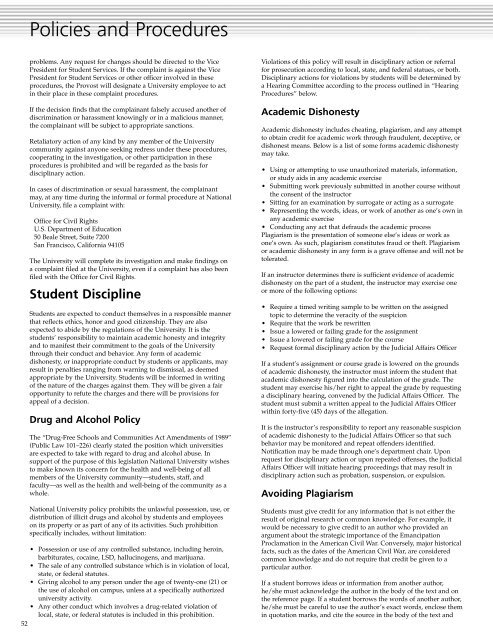Catalog 73 - National University
Catalog 73 - National University
Catalog 73 - National University
- No tags were found...
Create successful ePaper yourself
Turn your PDF publications into a flip-book with our unique Google optimized e-Paper software.
Policies and Proceduresproblems. Any request for changes should be directed to the VicePresident for Student Services. If the complaint is against the VicePresident for Student Services or other officer involved in theseprocedures, the Provost will designate a <strong>University</strong> employee to actin their place in these complaint procedures.If the decision finds that the complainant falsely accused another ofdiscrimination or harassment knowingly or in a malicious manner,the complainant will be subject to appropriate sanctions.Retaliatory action of any kind by any member of the <strong>University</strong>community against anyone seeking redress under these procedures,cooperating in the investigation, or other participation in theseprocedures is prohibited and will be regarded as the basis fordisciplinary action.In cases of discrimination or sexual harassment, the complainantmay, at any time during the informal or formal procedure at <strong>National</strong><strong>University</strong>, file a complaint with:Office for Civil RightsU.S. Department of Education50 Beale Street, Suite 7200San Francisco, California 94105The <strong>University</strong> will complete its investigation and make findings ona complaint filed at the <strong>University</strong>, even if a complaint has also beenfiled with the Office for Civil Rights.Student DisciplineStudents are expected to conduct themselves in a responsible mannerthat reflects ethics, honor and good citizenship. They are alsoexpected to abide by the regulations of the <strong>University</strong>. It is thestudents’ responsibility to maintain academic honesty and integrityand to manifest their commitment to the goals of the <strong>University</strong>through their conduct and behavior. Any form of academicdishonesty, or inappropriate conduct by students or applicants, mayresult in penalties ranging from warning to dismissal, as deemedappropriate by the <strong>University</strong>. Students will be informed in writingof the nature of the charges against them. They will be given a fairopportunity to refute the charges and there will be provisions forappeal of a decision.Drug and Alcohol PolicyThe “Drug-Free Schools and Communities Act Amendments of 1989”(Public Law 101–226) clearly stated the position which universitiesare expected to take with regard to drug and alcohol abuse. Insupport of the purpose of this legislation <strong>National</strong> <strong>University</strong> wishesto make known its concern for the health and well-being of allmembers of the <strong>University</strong> community—students, staff, andfaculty—as well as the health and well-being of the community as awhole.<strong>National</strong> <strong>University</strong> policy prohibits the unlawful possession, use, ordistribution of illicit drugs and alcohol by students and employeeson its property or as part of any of its activities. Such prohibitionspecifically includes, without limitation:• Possession or use of any controlled substance, including heroin,barbiturates, cocaine, LSD, hallucinogens, and marijuana.• The sale of any controlled substance which is in violation of local,state, or federal statutes.• Giving alcohol to any person under the age of twenty-one (21) orthe use of alcohol on campus, unless at a specifically authorizeduniversity activity.• Any other conduct which involves a drug-related violation oflocal, state, or federal statutes is included in this prohibition.52Violations of this policy will result in disciplinary action or referralfor prosecution according to local, state, and federal statues, or both.Disciplinary actions for violations by students will be determined bya Hearing Committee according to the process outlined in “HearingProcedures” below.Academic DishonestyAcademic dishonesty includes cheating, plagiarism, and any attemptto obtain credit for academic work through fraudulent, deceptive, ordishonest means. Below is a list of some forms academic dishonestymay take.• Using or attempting to use unauthorized materials, information,or study aids in any academic exercise• Submitting work previously submitted in another course withoutthe consent of the instructor• Sitting for an examination by surrogate or acting as a surrogate• Representing the words, ideas, or work of another as one’s own inany academic exercise• Conducting any act that defrauds the academic processPlagiarism is the presentation of someone else’s ideas or work asone’s own. As such, plagiarism constitutes fraud or theft. Plagiarismor academic dishonesty in any form is a grave offense and will not betolerated.If an instructor determines there is sufficient evidence of academicdishonesty on the part of a student, the instructor may exercise oneor more of the following options:• Require a timed writing sample to be written on the assignedtopic to determine the veracity of the suspicion• Require that the work be rewritten• Issue a lowered or failing grade for the assignment• Issue a lowered or failing grade for the course• Request formal disciplinary action by the Judicial Affairs OfficerIf a student’s assignment or course grade is lowered on the groundsof academic dishonesty, the instructor must inform the student thatacademic dishonesty figured into the calculation of the grade. Thestudent may exercise his/her right to appeal the grade by requestinga disciplinary hearing, convened by the Judicial Affairs Officer. Thestudent must submit a written appeal to the Judicial Affairs Officerwithin forty-five (45) days of the allegation.It is the instructor’s responsibility to report any reasonable suspicionof academic dishonesty to the Judicial Affairs Officer so that suchbehavior may be monitored and repeat offenders identified.Notification may be made through one’s department chair. Uponrequest for disciplinary action or upon repeated offenses, the JudicialAffairs Officer will initiate hearing proceedings that may result indisciplinary action such as probation, suspension, or expulsion.Avoiding PlagiarismStudents must give credit for any information that is not either theresult of original research or common knowledge. For example, itwould be necessary to give credit to an author who provided anargument about the strategic importance of the EmancipationProclamation in the American Civil War. Conversely, major historicalfacts, such as the dates of the American Civil War, are consideredcommon knowledge and do not require that credit be given to aparticular author.If a student borrows ideas or information from another author,he/she must acknowledge the author in the body of the text and onthe reference page. If a student borrows the words of another author,he/she must be careful to use the author’s exact words, enclose themin quotation marks, and cite the source in the body of the text and
















